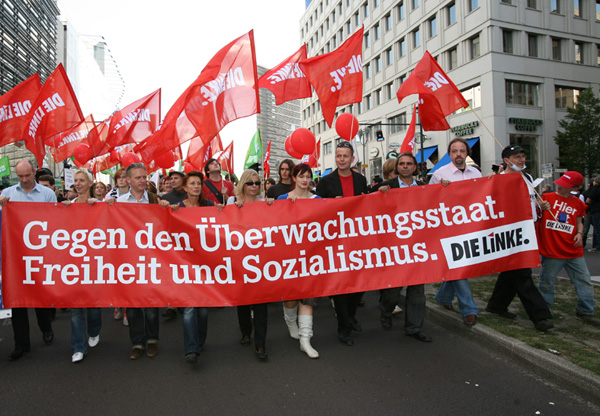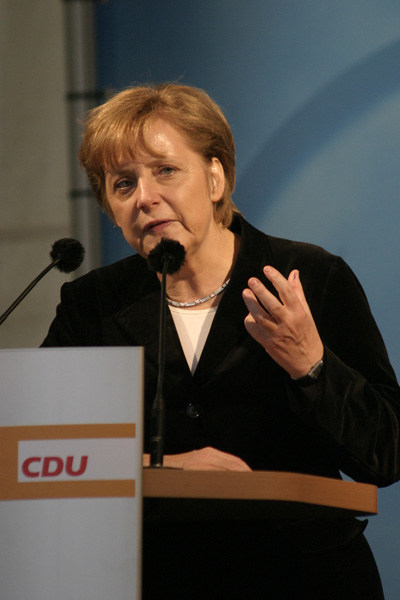On September 27 German electors will be voting in the general election. Recent local elections indicate significant growth in support for the Left Party (DIE LINKE). This is also reflected in the beginnings of shift to the left within the ranks of the unions. The crisis of capitalism is leaving its mark on German society.
Against the background of the world economic crisis and a sharp drop in industrial output, a general election is to be held in Germany on September 27. Although opinion polls point to the option of a right-wing majority and a coalition government of the Christian Democrats (CDU/CSU) and Liberals (FDP) as a likely outcome, it is not yet certain that the traditional bourgeois parties will re-conquer the combined overall majority in the Bundestag which they had held for nearly fifty years since the post war period. It was only in 1998 that the traditional bourgeois parties suffered a historic defeat. The swing to the left at that time ushered in seven years of a coalition government of Social Democrats (SPD) and Greens.
CDU leader and Chancellor Angela Merkel, who has been heading a coalition government of CDU/CSU and SPD since 2005, is now attempting to avoid any polarisation in the present election campaign by hiding away the programme of harsh attacks on workers’ living standards which is likely to be implemented after the crisis. Yet it is obvious that the bill for the 480 billion Euro rescue operations to bail out failing banks over the last 12 months and the drop in state revenues will soon be passed on to the working class after the election day. Already, bourgeois think tanks have been advocating measures such as a rise in VAT to 25%, an increase of the retirement age to 69 years, further cuts in social services and privatisations. Unemployment will sharply rise in winter and might even reach the magic five million mark early next year as the temporary scrapping bonus (a measure to pay owners of old cars €2500 to junk their old cars and buy new ones) which has stimulated an artificial motorcar boom in recent months has just expired. On top of that, many workers who have been on (state subsidised) short time work schemes in the last few months might face sackings soon and the credit crunch deplored by many smaller and medium sized enterprises might trigger off a new record wave of bankruptcies.
The Opel deal last week, when GM managers gave the green light for the sale of a majority stake to a group around the Canadian motorcar supplier Magna and the Russian Sberbank, came just in time before the election to create the bogus impression that this traditional motorcar manufacturer was in good hands now thanks to the politicians’ diplomatic skills. Yet day after day we are now hearing that Magna will axe thousands of jobs and possibly close down the plant in Antwerp (Belgium) and the uncertainty amongst Opel workers as to possible sackings is still there.
While many campaigners are presently trying to create the impression that the crisis is over and a new boom is ahead, these statements are not backed up by reality but rather are motivated by the desperate attempt by the ruling class to lull the electorate and above all the working class and secure a bourgeois majority.
Big business, however, cannot be sure of a triumph in ten days time since a lot will depend on the actual voter turnout and millions do not know yet if and who they are going to vote for. The political instability in the country was expressed by the recent state elections in Saxony, Thuringia and the Saarland on August 30. In two of these three federal states, Thuringia and the Saarland, Merkel’s CDU suffered dramatic losses of well over 10 percent and lost its overall majority. In both states, it was above all the Left Party (DIE LINKE) that gained enormously. In the Saarland, the westernmost state on the French border, DIE LINKE scored 21.3% and thus almost overtook the SPD whose share was down to 25.5%. In the Eastern state of Thuringia, DIE LINKE scored 27.4% as against the 18.5% of the votes cast for the SPD. In the latter state, there is an overall parliamentary majority for the two traditional working class parties – and this is the first time this has happened since the early 1920s when a government of left Social Democrats there leaned on the support of the Communist Party (KPD) who even joined the cabinet for a while in 1923.
What is striking in both cases is the class base that DIE LINKE has built up in recent years. They got a high proportion of their votes from the unemployed (33% in Thuringia, 46% in the Saarland) and blue collar workers (29% in Thuringia, 34% in the Saarland). In both states there was a “wind of change” which pushed up the voter turnout against the general trend towards rising abstentionism in recent years. In the Saarland, where DIE LINKE leader Oskar Lafontaine had started his career as an SPD lord mayor and state prime minister in the 1980s and where he is still very popular, the increase in voter participation was over 12 per cent. This swing also had the positive side-effect of undermining the support of the neo-fascist NPD which slumped from 4.3% (in 2004) to 1.5%. In Thuringia too, the NPD failed to score the crucial threshold of 5% of the votes cast needed to get into parliament. Only in Saxony, which has been under CDU rule for almost 20 years, did the workers’ parties do badly scoring 20.6% (DIE LINKE) and 10.4% (SPD) respectively. There the voter turnout was down by 7.4% and the NPD – in spite of severe losses – managed to maintain a reduced parliamentary representation. Yet on a national level there is no chance at present for any of the right-wing extremists to get any seats in the Bundestag.
Recent opinion polls indicate that the lead of the bourgeois parties is melting away and that both the CDU/CSU and SPD, partners in the present coalition, will do badly and lose at the expense of the smaller opposition parties – FDP, Greens, and DIE LINKE. While the CDU/CSU is still stuck around a possible result of some 35%, well below the 40% target, the Liberals have seen their support grow in recent years as they have been presenting themselves as the only real bourgeois and neo-liberal force and demagogically rebuke Merkel’s party for an alleged “social-democratisation”. On the other hand, while the SPD might score an all time low result of below 30 per cent, both the Greens and DIE LINKE are likely to benefit from the SPD’s weakness and score well over 10 per cent each. The Greens have sharply moved to the right since the 1990s. According to voter analyses, Green voters even have the highest average personal income of any of the major parties in the country as many of the students and ecologists that founded the party in the early 1980s have become lawyers, senior civil servants, doctors, and grammar school teachers. In a number of cities, local Greens have entered town hall coalitions with the Christian Democrats. Yet in the present election campaign they have been presenting themselves with social and left-wing slogans again, paying tribute to the somewhat critical mood against bankers and “casino capitalists” which has developed since the beginning of the crisis a year ago.
 DIE LINKE is concentrating its election campaign on social issues. Photo by DIE LINKE. DIE LINKE is concentrating its election campaign on social issues, calling for a 10 euro an hour minimum wage and the abolition of reactionary legislation which has lead to an impoverishment of the unemployed, starving them into accepting any badly paid job.
DIE LINKE is concentrating its election campaign on social issues. Photo by DIE LINKE. DIE LINKE is concentrating its election campaign on social issues, calling for a 10 euro an hour minimum wage and the abolition of reactionary legislation which has lead to an impoverishment of the unemployed, starving them into accepting any badly paid job.
SPD leaders have made it clear that they will not seek any left coalition including DIE LINKE on a national level. They argue that DIE LINKE was “against NATO and against Europe” and therefore is far from being a reliable ally in foreign policy. As a matter of fact, DIE LINKE is campaigning for an immediate withdrawal of German troops from Afghanistan and is correctly criticising the Lisbon treaty. So the only two realistic options we are faced with after the election are either a continuation of the present coalition under Merkel or a coalition of CDU/CSU and FDP.
Whatever the concrete outcome, attacks on the working class are on the order of the day. Over a period of time this will lead to social unrest to an extent we have not seen for generations, creating a fertile ground for Marxist ideas. It is not an accident that on Tuesday the national conference of IG BAU (the Building Workers’ Union) added the aim of a general strike for political demands into the union statutes. This decision was taken by a crushing majority of some 90% of the delegates and went directly against the advice of the national union executive that desperately tried to argue against it.
In the end, whatever constellation of parties will prevail in these elections, attacks on the social conquests of the German working class are going to inevitable. And the mood already developing within the working class – the indications of a shift to the left within the unions and the significant growth in support for DIE LINKE ‑ means that mobilisations against the bourgeois camp are equally inevitable. Things will change radically in Germany in the coming period.

